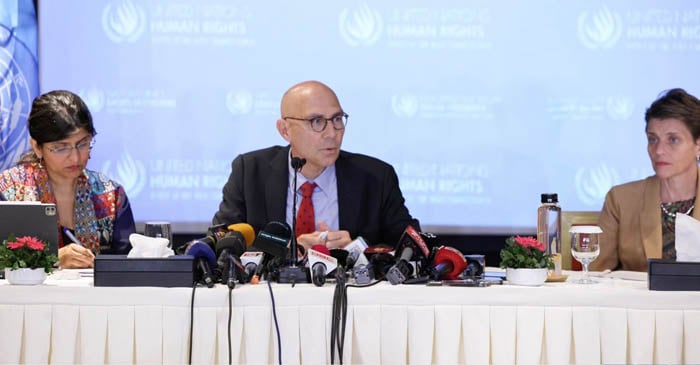

United Nations High Commissioner for Human Rights Volker Türk today emphasized that the reforms envisioned by Bangladesh's interim government must be sustainable to prevent abuses of power reprised in the past decades.
“This time, there must be justice. This time, reforms must be sustainable and durable, so that the abusive practices of the last decades are not repeated,” he stated during a press briefing as he concluded his inaugural two-day official visit to Bangladesh.
Türk highlighted the country's current opportunity for fundamental change, which he said could set a new course in governance, development, and economic policy anchored in human rights.
He noted the heightened expectations, inspired by recent social movements, to establish a solid foundation aimed at ending divisiveness, discrimination, and impunity.
“Inequality, cycles of revenge and retribution, marginalization, corruption, and serious human rights violations must be relegated to the past,” he remarked, underscoring the need to break these entrenched patterns.
The high commissioner also affirmed his office’s commitment to supporting Bangladesh in achieving these goals, stating, “UN Human Rights Office is ready to do everything for Bangladesh to succeed in this regard.”
He welcomed the recent statements by Chief Advisor Professor Dr. Muhammad Yunus reaffirming the country’s dedication to human rights, social justice, and accountability.
Türk noted Chief Adviser’s acknowledgment of the need for comprehensive reforms across institutions, including law enforcement, and the importance of addressing economic inequalities.
He commended the swift establishment of various commissions aimed at recommending reforms in key areas such as judiciary, electoral system, administration, police, constitutional affairs, and the Anti-Corruption Commission.
Additional commissions, he said, are reportedly being formed to address pressing issues related to health, media, labour rights, and women’s affairs.
“In my discussions today with several of the commissioners, we discussed the importance of trust-building, inclusivity and the lessons that Bangladesh can draw from experiences in other countries that have grappled with similar issues,” he said.
All these reforms, he said, could be a powerful step towards easing decades of intense political division in Bangladesh and curbing the patronage politics that have weakened its democratic foundations.
“The pursuit of justice for the brutal violence against protesters and other people – including children – killed and seriously wounded in July and August is a priority,” he added.
Türk met Chief Adviser Prof Muhammad Yunus and advisers before wrapping up his two-day visit.
